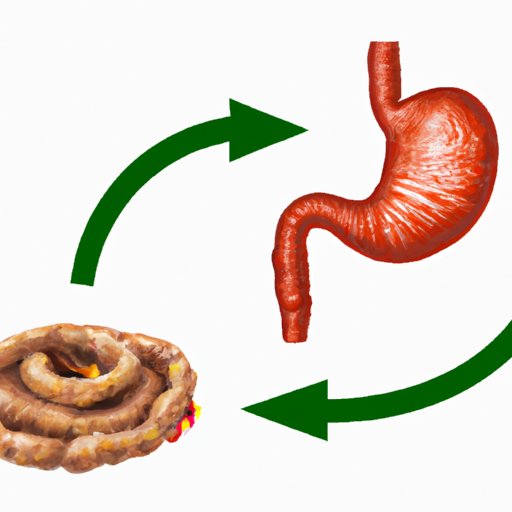
Introduction
Constipation is a common condition that affects many people, and it can have a significant impact on your quality of life. When you’re constipated, it’s not just uncomfortable – it can be painful and even dangerous if left untreated. In this article, we’ll explore how long you can go without poop, discuss normal bowel habits, and offer advice on how to deal with constipation naturally.
The Science Behind Bowel Movements
Understanding how the digestive system works is key to understanding bowel movements. After you eat, your food is broken down in the stomach and small intestine. The large intestine, or colon, then absorbs water and electrolytes from the leftover food, leaving behind waste material that is pushed out of the body through bowel movements.
The Normal Range of Bowel Habits
Everyone’s bowel habits are different, and what’s normal for one person may not be normal for another. That being said, there are some general parameters that can help you determine if your bowel habits are within a normal range.
Experts say that it’s normal to have between three bowel movements per day and three bowel movements per week. The consistency of your stool is also an important factor to consider – if your stool is hard or difficult to pass, that could be a sign of constipation.
Factors That Can Affect Bowel Movements
Several factors can impact bowel movements, including diet, exercise, stress, and medication. A diet that’s low in fiber and high in processed foods can cause constipation, as can a lack of physical activity. Stress and anxiety can also affect bowel movements by making it harder for the body to relax.
Medications like opioid painkillers, antidepressants, and antacids can also cause constipation. If you’re experiencing constipation and you’re taking any of these medications, talk to your doctor about alternatives.
When to Seek Medical Attention for Constipation
If you’ve tried natural remedies for constipation and you’re still not having regular bowel movements, it might be time to talk to your doctor. Additionally, if you’re experiencing any of the following symptoms, seek medical attention immediately:
- Blood in your stool
- Persistent abdominal pain
- Unexplained weight loss
- Vomiting or nausea
Depending on your symptoms, your doctor may recommend tests like a colonoscopy or stool tests to determine the underlying cause of your constipation.
Natural Remedies for Constipation
There are several natural remedies that can help relieve constipation. First and foremost, make sure you’re drinking plenty of water throughout the day to help keep your stool soft. Eating a diet that’s high in fiber, including fruits, vegetables, and whole grains, can also help promote regular bowel movements.
Exercise is another natural remedy for constipation. Moving your body can help stimulate the muscles in your colon and promote a bowel movement. And if you’re experiencing constipation due to stress, practices like meditation and yoga can help alleviate symptoms.
The Dangers of Holding in Stool
If you’re constipated, it might be tempting to ignore the problem and hope it goes away on its own. However, holding in stool can have serious health consequences. Over time, the waste material can build up in your colon and cause a condition called fecal impaction. Symptoms of fecal impaction can include abdominal pain, bloating, and nausea, and it can require medical intervention to correct.
In severe cases, holding in stool can also cause tears in the lining of the rectum or anus, which can be painful and cause further complications like infection.
Conclusion
Constipation is a common condition, but it’s important to take it seriously and seek help when needed. By understanding what’s normal for your body, making lifestyle changes, and seeking natural remedies, you can alleviate symptoms and promote regular bowel movements. And if you’re experiencing any warning signs or if your constipation persists despite home remedies, don’t hesitate to talk to your doctor.





